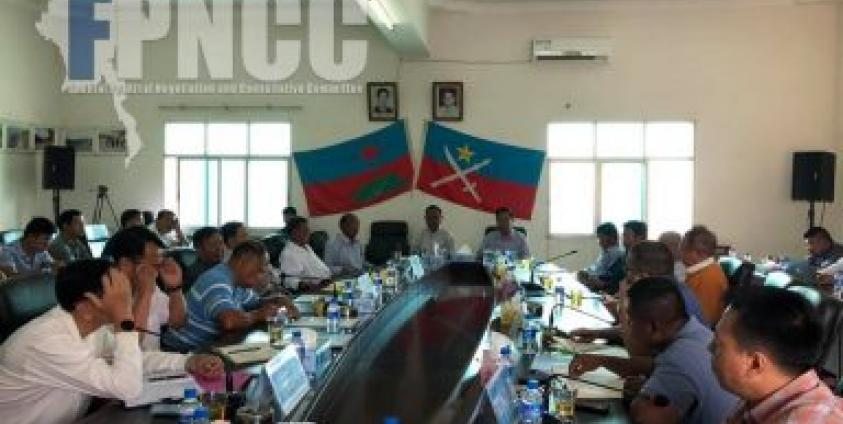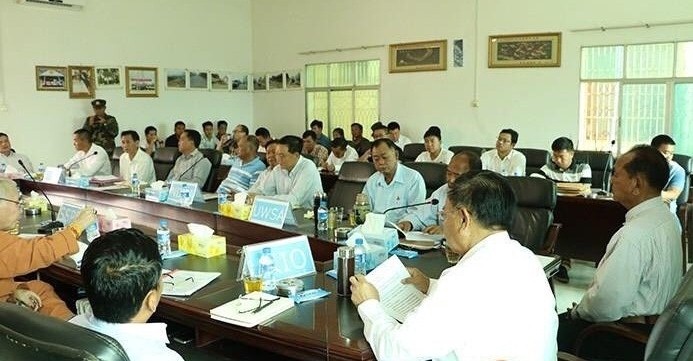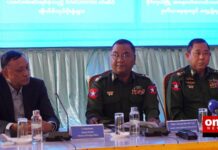It is quite well known and already an accepted fact that China is doing everything to reconcile the warring parties involving the Myanmar Army or Tatmadaw and the Federal Political Negotiation and Consultation Committee (FPNCC) members’ four-party military alliance – Kachin Independence Army (KIA), Myanmar National Democratic Alliance Army (MNDAA) or Kokang, Ta’ang National Liberation Army (TNLA) and Arakan Army (AA), known as the Northern Alliance – Burma (NA-B).
It should be noted that in contrast to the NA-B, FPNCC is strictly a political alliance, which involved seven Ethnic Armed Organizations (EAOs), based in the north of the country’s Kachin and Shan States.
From this outgoing point China has been doing a lot of mediation, at times forcefully pushing for all-inclusiveness participation in the peace process to get the job done, as was evident by its shuttle diplomacy meeting the Commander-in-Chief Min Aung Hlaing, State Counsellor Aung San Suu Kyi and FPNCC leadership. This has enabled its the FPNCC members to take part in the opening ceremony of third 21st Century Panglong Conference (21CPC) in mid-July recently, which it also has done during the second 21CPC in May 2017.
The popularly used 21CPC is officially known as Union Peace Conference – 21st Century Panglong (UPC-21CP).
But to date, this exercise has only generate cautious optimism, with partial success being achieved but still a long way from a breakthrough that would lead to a holistic national reconciliation process.
On August 5, the Kachin Independence Organization (KIO) and the Tatmadaw met at Dali City in China’s north-western Yunnan province, but ended abruptly as the latter sets preconditions for talks.
Again, a meeting scheduled for August 11 between the Tatmadaw and NA-B was also postponed, but no reason was given.

Kachin and Tatmadaw meeting
According to Kachinland News, the KIO came to the meeting well prepared and to show its seriousness and respect its delegation was led by the two top leaders, Chairman General N’Ban La and Vice-Chairman General Gun Maw. They met about an hour with the Tatmadaw’s representative Lieutenant General Tun Tun Naung and his team.
The report said: “KIO on its part came prepared to talk about armed conflicts since the renewed war began in 2011, review the implementation of the bilateral agreements made in 1994 and 2013, implement a concrete ceasefire, discuss internally displaced persons (IDPs) issue, and invite China as a mediator and as a witness in signing the future agreements.”
As it turned out Tun Tun Naung told the KIO that it has to uphold the three main national causes, promise to never secede from the Union, and join multi-party democracy system implemented by their predecessors in order to begin negotiation. And as the KIO couldn’t agree with the preconditions set by the Myanmar Army, the meeting ended abruptly.
NA-B and Tatmadaw meeting
Again, the meeting scheduled for August 11 between the NA-B and Tatmadaw was also postponed, possibly due to the Tatmadaw’s failure.
According to Network Media report of August 13, KIO spokesman Colonel Naw Bu said: “The main responsibility for not being able to meet might be the Tatmadaw. It doesn’t seems to be from the part of the ethnic nationalities.”
However, he believed that it could be just a postponement and change of date, while the TNLA spokesman Major Mai Aik Kyaw optimistically stressed: “Originally, they wanted to meet us. Both sides want to meet, but the date hasn’t been negotiated yet. The date hasn’t been set when they made the offer. Both sides want to meet. It hasn’t been cancelled.”
But one knowledgeable insider source speculated: “As U Khin Zaw Oo, point man of the Tatmadaw within the government’s Peace Commission (PC), is not able to go, there isn’t any point in sending Dr Tin Myo Win and U Thein Zaw without him and subsequently, the meeting has to be postponed. It looks like he hasn’t received any instructions from his boss, the Commander-in-Chief Min Aung Hlaing. The PC informed Mr Sun Guoxiang of the situation who is arranging the meeting on 11 August.”

Outlook and Perspectives
The unsuccessful meeting with the KIO and the postponement of the meeting with with the NA-B could be viewed as the Tatmadaw not ready to cut a real ceasefire deal with the former and not keen to strive for a political compromise with the latter for whatever reason it may have in store.
When the KIO aims at technically achieving ceasefire and management of the IDPs, the Tatmadaw came up with political preconditions like acceptance of the three main national causes; not to talk about secession; and to accept and participate in the present multi-party system political setup.
The three main national causes taken over by the Tatmadaw from the previous military governments often stated by the Commander-in-Chief and other Tatmadaw leaders are: non-disintegration of the Union; non-disintegration of national solidarity; and perpetuation of sovereignty.
However, all in all, the core of the message is to accept the military-drawn, 2008 Constitution without condition, surrender arms and participate in the present multi-party political system. In other words, the EAOs should give up their political aspirations, surrender arms and join the government setup.
But the Tatmadaw failed to acknowledge that if the EAOs accept such a deal, they won’t be fighting against the government in the first place. There is a genuine political grievances among the ethnic nationalities and if they are to be resolved through political means there needs to be a compromise; not demanding them to accept the system which they think is unjustified and are fighting against to restore their birthright self-determination.
China is keen to resolve the ethnic conflict , as Myanmar is seen as a link that connects both the 21st Century Maritime Silk Road and the Silk Road Economic Belt, making it an integral component of both, so that its ambitious Belt and Road Initiative (BRI) mega project could soon be realized.
But the Myanmar government is faced with a dilemma on whether to completely put itself under the protective shell of permanent veto-wielding China in the United Nations Security Council (UNSC), to fend off the international community’s anger and condemnation on the exodus of some 700,000 Rohingyas to Bangladesh, and also becoming wholly dependent on it economically or try to find a way out on how not to rely on just one regional power, as a non-aligned country in a true sense.
As it is, the earnest ceasefire deal with various EAOs, especially those along the China-Myanmar border, hinges largely upon the political good will of the Tatmadaw and to what extend it is willing to accommodate in realizing national reconciliation and eventual political settlement with the ethnic nationalities which will encompass the whole country.











Leave a Comments